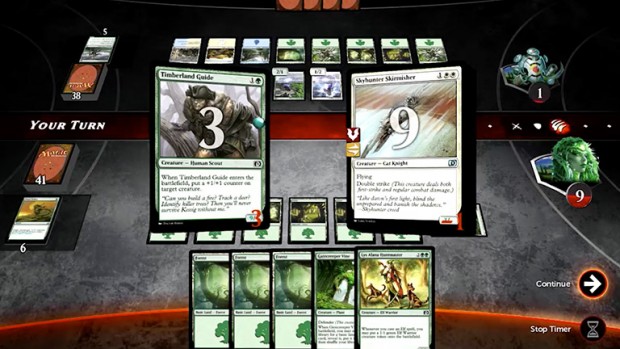Magic: The Gathering Creator Issues Manifesto Against Abusive Cash Shop Practices
Just yesterday in the MMOBomb Skype -- while Magicman was anguishing over not being able to find the Final Fantasy TCG in his area -- I jokingly referred to CCGs as "doing pay-to-win random lootboxes and courting whales since 1993."
1993, of course, was the year Magic: The Gathering was released, and, if you stop to think about it, its random, multiple-rarity schemes are the exact sort of thing that modern video game players hate in their free-to-play games. Still, they've gone on for over 20 years -- and sports cards for much longer, with similar "random rarity."
So today I discovered a manifesto by no less than the creator of Magic: The Gathering himself, Richard Garfield, who weighs in on the abusive nature of cash shops in gaming. Written a few weeks ago, Garfield's screed covers ground that is mostly familiar to long-time gamers: how many games, especially free-to-play games are thinly concealed Skinner boxes designed to extract the most possible money from a tiny percentage of players looking for that adrenaline rush of unpackaging that newest goodie. He draws a few broad comparisons, to alcoholism and gambling, and says that the biggest whales were "people who couldn’t afford to be spending that sort of money" without much evidence to back them up, but the general sentiment is something we've heard plenty of times before.
Garfield doesn't condemn free-to-play games or cash shops entirely. Instead, he lays out a notion of how they could be fair and how that could be baked into the game design. He also brings up the notion of a "hard spending cap," something I've explored, and seen as not the greatest idea when put into practice. And, of course, he comes up with an explanation as to how CCGs can fall under the category of a "fair" gaming experience.
In the end, he vows not to invest any more time or money into games he considers abusive in their monetization practices and urges other players to do the same -- while recognizing that the people likely to buy into that way of thinking are probably not the ones who will have any kind of significant impact on a game's bottom line.
In any case, it's an interesting read from a notable voice in gaming's history, even if it doesn't cover much in the way of new ground. Give Richard Garfield's manifesto a look and see if you agree with it.
Related Articles
About the Author

Jason Winter is a veteran gaming journalist, he brings a wide range of experience to MMOBomb, including two years with Beckett Media where he served as the editor of the leading gaming magazine Massive Online Gamer. He has also written professionally for several gaming websites.
More Stories by Jason WinterRead Next

Heroes of the Storm has a new mode coming...
You May Enjoy

And lowers the cost of entry at the same time.

The upcoming update introduces the game’s 64th Warframe and a new game mode.

PC MapleStory fans are about to have something else to distract them from work.

Registration is open.

The whole gaming industry is just a scam. Only solution is to stop playing games completely.
Developers and publishers are lowest life form and things are only going to become worse with time.
A far more ethical business model would be one that relies on more reasonably-priced and complete purchase options for a wider part of the audience instead of extorting huge sums from a small number of vulnerable people.